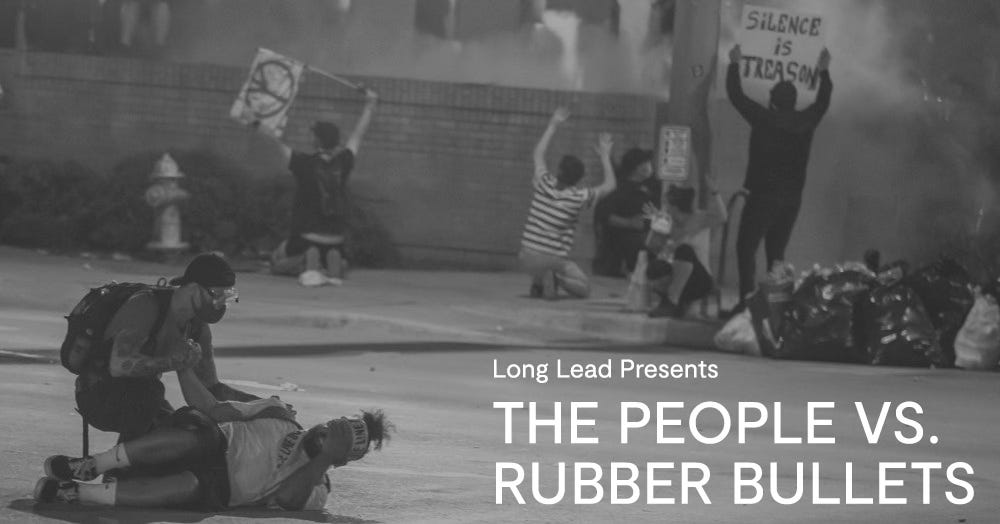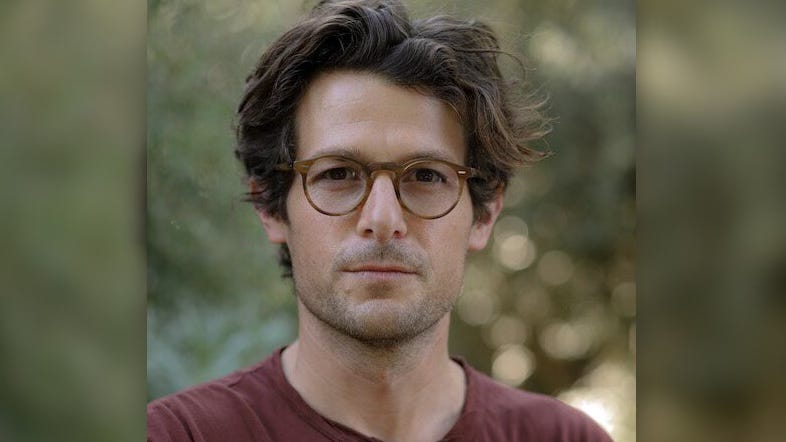“I have a duty to share what I saw.” Jacob Soboroff on his role in Trump immigration documentary 'Separated'
The NBC News correspondent calls the film about the Trump administration’s child-separation policy “more relevant than I ever could have possibly anticipated.”
There are many horrible facts laid out in Academy Award–winning director Errol Morris’s Separated — a powerful new documentary about the Trump administration’s policy of separating migrant children from their parents at the southern border — not least of which is that more than 1,300 kids have yet to be reunited with their families, according to the Department of Homeland Security. But even more disquieting is the seeming inevitably that such child separations will occur again, on an even larger scale, in Donald Trump’s second term.
“Just go watch Cecilia Vega’s 60 Minutes interview with [incoming ‘border czar’] Tom Homan, where he’s talking about, ‘Well, American citizens can leave the country, or we will separate them from their families,’” says Jacob Soboroff, an NBC News correspondent and the author of the bestseller Separated: Inside an American Tragedy, on which Morris’ film is based. “It’s not only that it can happen again, as [former Office of Refugee Settlement official] Jonathan White said [in the film], but they’re publicly planning on it happening again in a bigger way than the first time.”
Soboroff is an executive producer of the documentary and appears as a talking head in the film, which is in the midst of a limited theatrical run and debuts on MSNBC on Saturday. “I think it’s more relevant than I ever could have possibly anticipated,” Soboroff tells Depth Perception in a video call from the Los Angeles bureau of NBC News. “We didn’t know Trump was going to run again. We didn’t know he was going to win, obviously, and now some of these same characters are on the verge of coming back and having roles that are more powerful than they were in this period that we document.”
Depth Perception spoke to Soboroff about the reporting that informed his book, the controversy surrounding the documentary’s air date, and the challenges facing journalism under a second Trump administration. The following has been edited for length and clarity. —Mark Yarm
In 2018, you were invited by the Trump administration to tour two facilities where they were detaining kids that they had separated from their families. In the documentary, you say how you felt that the government was using you and your reporting as a tool to help scare off potential immigrants. How manipulated did you feel?
What made me feel vulnerable was I was a television reporter and I wasn’t allowed to bring my camera in the detention centers. I had to rely on my little blue notebook. I’ll never forget the first time I came out. I did an eight to 10 minute live hit with Chris Hayes about what I had seen inside the facility, and I literally was recounting to Chris what is in that little blue notebook. In the moment that I went in and I toured for the first time, I felt manipulated, like, “How am I ever going to do justice to what I’m seeing and hearing and smelling?” But I knew in the moment of doing that live television hit, and the response that I got at the time, that I was going to be able to retake control of the narrative, and that was only because of the support of my bosses.
It’s stressed in the film that this can and likely will happen again, because Congress hasn’t done anything to prevent it. Do you hope that this film will enact change?
In my position at NBC, I’m not here to tell Congress what law to pass or what not to pass. Jonathan White has done that on his own in the movie. There is no law that bans family separation, despite, as he says, numerous displays of “moral histrionics” by the people in Congress about this. What I do hope for is a shift in the vantage points from which we all think about immigration.
One of my favorite parts about the movie is that Errol opens it listening to four different presidents, Democrat and Republican, essentially saying the same thing about immigrants — talking about them through the lens of criminality. And instead of pointing a finger at only Donald Trump about why this happened — and surely I’m not excusing the bigotry or the racism or the policies that led to specifically separation; they were uniquely Trumpian — what I hope that the film does is give people a different vantage point from which to think about this, which is Trump wouldn’t have been able to do this were it not for decades of bipartisan deterrence-based, punitive-based immigration policy. And ultimately, Biden and Harris both continued that in some form, despite promises of a departure from that system.
I end the film by saying, “People want to know less about what’s going on,” and I hope that people take their ostrich head out of the sand.
“Less lethal” means “still deadly”

For decades, police have championed less-lethal munitions as life-saving alternatives to deadly force. Their history, however, tells a different story — one of imprecise science, unmeasured usage, untrained police forces, death, and disfigurement.
With revelatory reporting by Linda Rodriguez McRobbie, stunning original and historical photography, and a captivating multimedia website, “The People vs. Rubber Bullets” tells the full, brutal story of kinetic impact projectiles and their usage, from rubber bullets’ invention in 1970s Northern Ireland all the way through the 2020 Black Lives Matter protests.
This award-winning, six-part, longform feature examines law enforcement's use of these weapons in crowd control, chronicling a number of less-lethal victims and their struggle for justice. Read the stories of those whose lives were irrevocably changed.
Errol Morris himself complained on X that the film was scheduled to air on MSNBC after the election. There was a report that NBC delayed the MSNBC premiere in the hopes of getting Trump to agree to another debate. What can you tell me about that situation, and is it also frustrating to you that it’s airing on MSNBC post-election?
Both me and Errol want it to be seen by as many people as possible, as soon as possible, so that we could have the conversation you and I are having. Now, it’s not my role to influence the outcome of the election as a journalist, but it is my role to make sure that my reporting and projects I’m involved with are driving issues that people in power can’t afford to avoid. I’m glad it’s coming out now. We screened in dozens of theaters around the world ahead of the election, and we pushed as hard as we could so that it could be seen by as many people as it could. I’m proud of where we are today.
With Trump threatening to crack down on the press in his second term, what challenges do you anticipate in reporting on immigration for the next four years?
What I hope is that people who are directly impacted by these policies will be able to speak out, and up, for themselves. That, if you recall, is what made family separation something that connected so deeply with so many people. [Thanks to a ProPublica investigative report] we heard the voices of the children at the detention center that were crying when the Border Patrol was mocking them about the separations or being there alone. I hope one day there’ll be a Shoah Foundation–like project, where every kid that went through this will speak up on their own behalf, and not have to rely on somebody like me, honestly, because I shouldn’t be the one to tell this story.
“When I see the power of reporting that people did around family separation, and how it brought people into the streets to stand up against something that was so clearly inhumane, it gives me hope for what journalism can do again.” —Jacob Soboroff
Do you have any fears that you might face retribution for your reporting?
I mean, that’s what I signed up for. I’ve got to be a big boy about it. We’re doing this because we believe that this is the right thing to do. Same thing for Jonathan White. He went out there and basically threw the first punch, as it were, as a sitting career government official. He decided to not wait for somebody to come and find him, but to be affirmatively speaking out against something that you know he experienced himself. I don’t know Jonathan White, but I do feel like I have a duty to share what I saw and not shrink away from it — both before I knew Trump was going to be president again, and after.
It feels like dark days ahead. What gives you hope for the future of journalism?
When I see the power of reporting that people did around family separation, and how it brought people into the streets to stand up against something that was so clearly inhumane, it gives me hope for what journalism can do again. When I saw the movie for the first time, seeing the hundreds of thousands of people [protesting] in the street — I had forgotten about that, honestly. It reminded me that while this is a really dark story, this is also a really hopeful story about the power people have to affect policy and to affect change. And I don’t know what the version of that’s going to be in the next four years, but I’ve seen it happen once, and I know that it’s possible it will happen again.
Further reading from Jacob Soboroff
Separated: Inside an American Tragedy (Mariner Books; originally published July 7, 2020)
“Kids In Immigrant Detention Center ‘Effectively’ Incarcerated” (MSNBC’s All In, June 13, 2018)
“Inside Detention Facilities Near the Mexico Border” (MSNBC, June 17, 2018)
“Jacob Soboroff interviews Homeland Security Secretary Alejandro Mayorkas” (NBC News, March 6, 2021)
“Ukrainian Refugees Coming to America” (NBC’s Today, April 22, 2022)
“Trump Accepts Third Nomination for President” (MSNBC, July 18, 2024)







And MSNBC backed off from airing this film before the election. It was scheduled and I had it programmed to record, then it was gone from the guide and I read a decision that it was prejudicial had been made. And they wonder why their ratings are dropping. Giving relevant information to voters is not prejudice, it's doing their damn jobs. Think faux would have made this decision anout a film that hurt Harris or Biden, hell no they would not.
Thank you Jacob. My grandkids were born here. They are in danger as their father was Hispanic. He was also born here. We are Caucasian. I cannot describe my fear but it makes me feel like I could be violent . No natural born citizen can be deported because of their skin color. We cannot allow it. It is against our constitution and our laws.